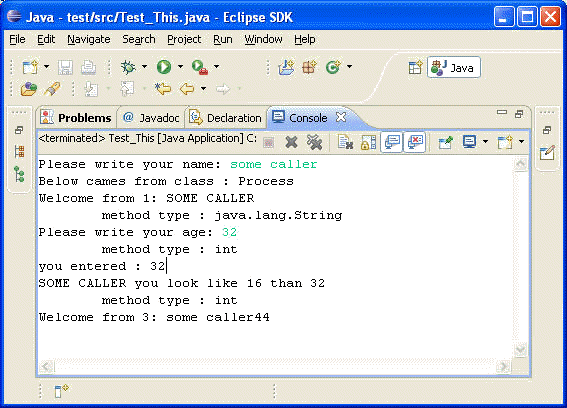| Overloading methods. | Overriding method. |
|---|---|
|
class A extends An_abstractclass{
public String method_1(String str)
{--do something--- }
class B extends An_abstractclass{
public String method_1(String str)
{--do something else--- }
abstract An_abstractclass
{
public String method_1(String str);
}
|
- When a class defines a method with same method name, argument types, argument order and return type as a method in its super class, its called method overriding.
- The method in the super class is said to be overridden by the method in the subclass.
- Overriding method actually replaces the behavior in super class for a subclass.
- Rules for overriding
- Methods overriding cannot be declared more private than the super class method.
- Any exceptions declared in overriding method must be of the same type as those thrown by the super class, or a subclass of that type.
- Methods declared as final cannot be overridden.
- An overriding method can be declared as final as the keyword final only suggests that this method cannot be further overridden.
- Methods declared as private cannot be overridden as they are not visible outside the class.
- Overriding method can call the overridden method (just like any other
method) in its super class with keyword super.
The call super.method() will invoke the method of immediate super class. - Though keyword super is used to refer super class, method call super.super.method() is invalid.
- If two (or more) methods of a class (whether both declared in the same class, or both inherited by a class, or one declared and one inherited) have the same name but different signatures, then the method name is said to be overloaded.
- The signature of a method consists of the name of the method and the number and types of formal parameters in particular order. A class must not declare two methods with the same signature, or a compile-time error occurs.
- Only the method name is reused in overloading, so method overloading is actually method name overloading.
- Overloaded methods may have arguments with different types and order of the arguments may be different.
- Overloaded methods are not required to have the same return type or the list of thrown exceptions.
- Overloading is particularly used while implementing several methods that implement similar behavior but for different data types.
- Overloaded methods are independent methods of a class and can call each other just like any other method.
- Constructor Overloading
- Constructors can also be overloaded in similar fashion, as they are also methods.
- Java has some classes with overloaded constructors. For example,
wrapper class for int has two
overloaded constructors. One constructor takes
int as argument and another takes
string argument.
Integer aNumber = new Integer(2);
Integer anotherNumber = new Integer("2005");
- One constructor can call another overloaded constructor of the same class by using this keyword.
- One constructor can call constructor of its super class by using the super keyword.
import java.io.*;
import java.lang.reflect.*;
public class Test_This {
public static void main(String[] args) throws IOException{
// TODO Auto-generated method stub
InputStreamReader isr = new InputStreamReader(System.in);
BufferedReader br = new BufferedReader(isr);
String str ="", str1="";int n1=0, n2 = 1;
Process pp = new Process();//object is created
Class gt = pp.getClass();
Method[] mt = gt.getMethods();
try{
System.out.print("Please write your name: ");
str = br.readLine();
if(pp.getClass()== Process.class){
System.out.println("Below cames from class : " + pp.getClass().getName());
System.out.println(pp.method_function(str)); //calling this method using object pp
System.out.println("\tmethod type : " + mt[1].getReturnType().getName());
System.out.print("Please write your age: ");
str = br.readLine();
n1 = Integer.parseInt(str);
System.out.println("\tmethod type : " + mt[2].getReturnType().getName());
System.out.println(pp.method_function(n1)); //calling this method using object pp
}
}//try
catch(NumberFormatException e)
{ System.out.println("data was blank");}
}
}
class Process
{
//class body
public int n1 =12; String name = "";//defined and instantiated a filed
public String method_function(String str)
{
//function body
name += str.toUpperCase();
System.out.print("Welcome : " );
return name;
}
public String method_function(int str)
{
//function body
if (str<=20)
{
name += " you look like 16 than " + str;
}
else
{
name += "you are under age :";
}
System.out.println("you entered : " + str);
return name;
}
}
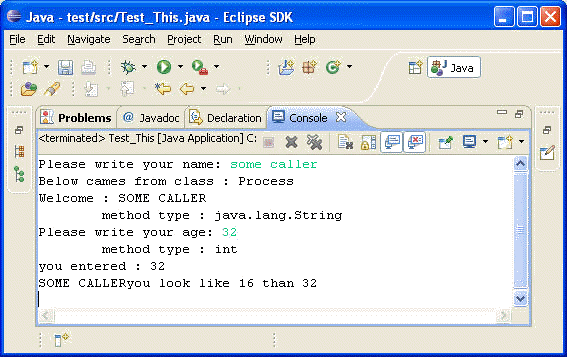
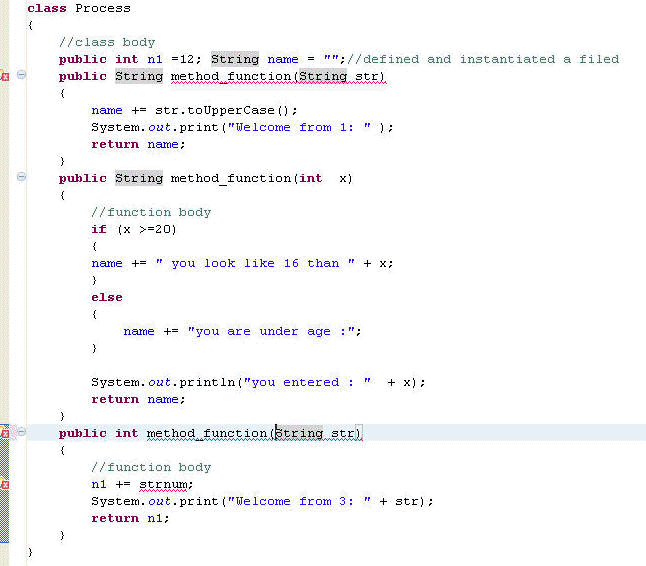
OR
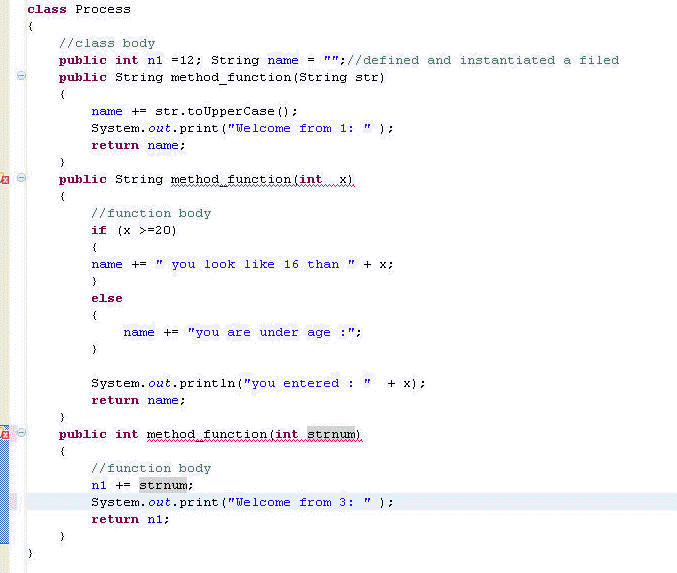
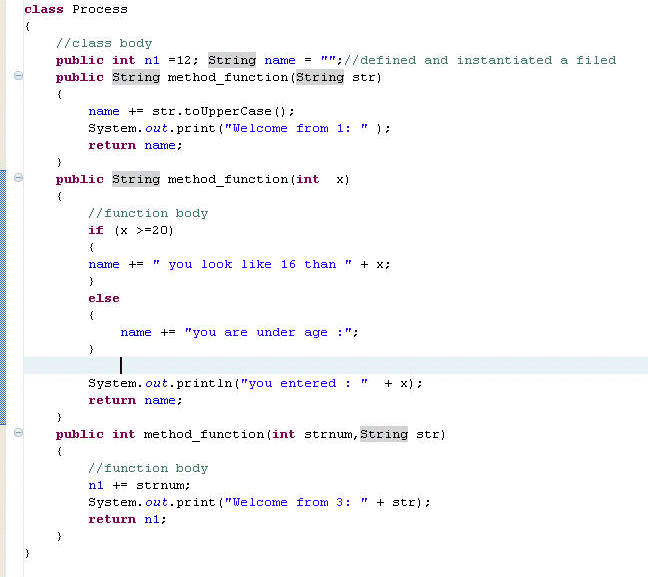
import java.io.*;
import java.lang.reflect.*;
public class Test_This {
public static void main(String[] args) throws IOException{
// TODO Auto-generated method stub
InputStreamReader isr = new InputStreamReader(System.in);
BufferedReader br = new BufferedReader(isr);
String str ="", str1="";int n1=0, n2 = 1;
Process pp = new Process();//object is created
Class gt = pp.getClass();
Method[] mt = gt.getMethods();
try{
System.out.print("Please write your name: ");
str = br.readLine();
if(pp.getClass()== Process.class){
System.out.println("Below cames from class : " + pp.getClass().getName());
System.out.println(pp.method_function(str)); //calling this method using object pp
System.out.println("\tmethod type : " + mt[1].getReturnType().getName());
System.out.print("Please write your age: ");
str1 = br.readLine();
n1 = Integer.parseInt(str1);
System.out.println("\tmethod type : " + mt[2].getReturnType().getName());
System.out.println(pp.method_function(n1)); //calling this method using object pp
//
System.out.println("\tmethod type : " + mt[3].getReturnType().getName());
System.out.println(pp.method_function(n1, str)); //calling this method using object pp
}
}//try
catch(NumberFormatException e)
{ System.out.println("data was blank");}
}
}
class Process
{
//class body
public int n1 =12; String name = "";//defined and instantiated a filed
public String method_function(String str)
{
name += str.toUpperCase();
System.out.print("Welcome from 1: " );
return name;
}
public String method_function(int x)
{
//function body
if (x >=20)
{
name += " you look like 16 than " + x;
}
else
{
name += "you are under age :";
}
System.out.println("you entered : " + x);
return name;
}
public int method_function(int strnum,String str)
{
//function body
n1 += strnum;
System.out.print("Welcome from 3: " + str);
return n1;
}
}
